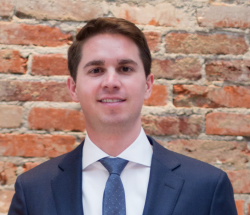In a post last month, I summarized recent research, led by Alex Bell and Raj Chetty, revealing that the U.S. economy draws on a relatively narrow slice of its population to fuel new innovations. Bell and Chetty argue that including more talented young people from a more diverse range of communities, genders, and ethnicities in the innovation economy has great potential to expand aggregate innovation rates nationwide. As the major nodes for technological innovation, cities and metropolitan areas—and the networks that shape and invest in their innovation ecosystems—are vital players in any such effort.
In many ways, Atlanta’s TechSquare Labs embodies this dynamic. Rodney Sampson, partner and head of inclusion and equity initiatives at TechSquare Labs, joined me via email for a discussion about the evolution of TechSquare Labs, and what lessons it may hold for other communities around the country.
Your background is as a technology entrepreneur and investor. Now you’re helping run TechSquare Labs in Atlanta. To begin, what is TechSquare Labs?
TechSquare Labs is an incubator, seed fund, and 25,000 square feet of coworking and corporate innovation space that I helped to launch, along with Dr. Paul Judge and Allen Nance, in October 2015. We are driven to “Build Something from Nothing,” with companies ranging from two guys (or ladies) and a laptop to established enterprises looking to stay ahead of the pack. We do this by combining experience in patents, research, and team-building with a network that spans from freshman coders to Fortune 500 CEOs. Ultimately, we exist at the intersection of diverse talent and big problems.
Many incubators exist, but few match TechSquare’s diversity in terms of entrepreneurs, funders, and mentors. Has ethnic and gender diversity been an explicit part of your strategy?
For TechSquare Labs, we didn’t have to mandate it explicitly. Look at our partners and team. It includes African Americans, women, Latinos, and white Americans. It’s who we are, so we intentionally consider the viability of minority and women cofounders when they apply for membership, seek funding, or look to invest with us. We do not have the biases present in many investors about the ability of African Americans (or Latinos, or women) to be viable technical cofounders; nor do we have doubts about the ability of African Americans to invest in startups or venture funds. Candidly, we don’t have to go through the “wow, black people can actually build companies” phase.
Let’s look at the data. McKinsey has shown that companies with high levels of gender and ethnic diversity are 15 and 35 percent more likely, respectively, to outperform their industry averages. Diversity is a path to better returns.
Regarding our investment thesis, we invest in high-growth companies that have technical cofounders, defensible intellectual property, and a clear runway to fundability and monetization. Because we are a diverse team that works very hard to create an inclusive innovation, entrepreneurship, and investment ecosystem—whereby all of our members can be and feel visible—we attract diverse technical cofounders and builders. So, whether it is Storj (Shawn Wilkinson), Stackfolio (Pavleen Thukral), Monsieur (Barry Givens), or Luma (Paul Judge), the cofounding teams of our investment portfolio and incubated startups are pretty diverse.
The goal of investing in high-growth startups is to accelerate their traction and scale. Scalable technology companies create more high-wage jobs and, if highly successful, can create new millionaires, perhaps even new billionaires. These millionaires—particularly when they come from underrepresented communities—can have tremendous impact on their local communities and the startup community from which they have learned and benefited.
How are you broadening the potential pipeline of entrepreneurs from disadvantaged communities through initiatives like #codestart?
It’s simple. While a lot of organizations focus their time and resources on having conversations about having conversations about solving the diversity in technology challenge, we just started solving it. We partnered with our city’s workforce development agency to launch #codestart—a 12-month coding, career readiness, financial literacy, counseling, and entrepreneurship oriented, residence-based program designed specifically for opportunity youth, ages 18–24. Today, the majority of these students are working in paid internships or apprenticeships in Atlanta. From there, we partnered with The White House, Opportunity @ Work, The Iron Yard, the Atlanta Workforce Development Agency, and local software developer employers to get Atlanta designated as a TechHire city. This designation subsequently led to two Department of Labor grant awards totaling $7.6 million.
Understanding that scaled initiatives can’t depend on government support long-term, especially given political volatility, we asked the nation’s largest coding schools to partner with us to launch what will soon be known as the Katherine G. Johnson Fund. The fund is a $100 million scholarship designed to provide full-tuition scholarships for women and minorities from low-income and underserved communities to attend a code school in 25 cities over the next five years.
How do you measure success, and what has been the impact of TechSquare Labs in Atlanta thus far? What are you trying to accomplish over the next, say, two years?
Since 2013, the TechSquare Labs ecosystem has incubated, invested in, and supported companies that have raised over $250 million in follow-on capital and created over 500 new jobs. The goal is to continue investing in the smartest talent solving the toughest problems. From there, we want to support these startups in raising more follow-on capital and creating more jobs.
Although TechSquare Labs is focused on Atlanta, I’d like to see other cities, municipalities, and colleges and universities launch similarly inclusive innovation, entrepreneurship, and investment ecosystem-building initiatives.
What advice would you give to organizations in other cities that want to make their innovation ecosystems more diverse?
For starters, city leadership can do a few things. First, leaders can add computer science, coding, technical training, and other forms of STEAM (science, technology, engineering, arts, and mathematics) education to their K–12 curricula and after-school programming. Second, they could attract a coding school to the city. Third, cities can invest from their general funds to launch inclusive innovation, entrepreneurship, and investment initiatives. This is the workforce and economic development model for today and the future—and we can help in that effort. We’re launching Opportunity Ecosystem as an inclusive innovation, entrepreneurship, and investment advisory and building platform. The goal is to build inclusive entrepreneurial hubs in partnerships with cities, municipalities, and educational institutions.
Nongovernment actors such as incubators, entrepreneurial centers, and investors (angels, venture funds, etc.), which are still predominantly white-led, can also take a series of actions to advance diversity. These organizations can fund coding schools and computer science undergraduate educational opportunities for minorities. They can fund paid internships and apprenticeships at startups, technology companies, and venture funds. And they can partner with organizations like TechSquare Labs and Opportunity Ecosystem to invest directly in minority cofounded startups, and/or support the launch of minority-led incubators and entrepreneurial centers in hyperlocal markets.







Commentary
Building a broader, more diverse pool of innovators: A Q&A with Rodney Sampson of TechSquare Labs
December 20, 2016